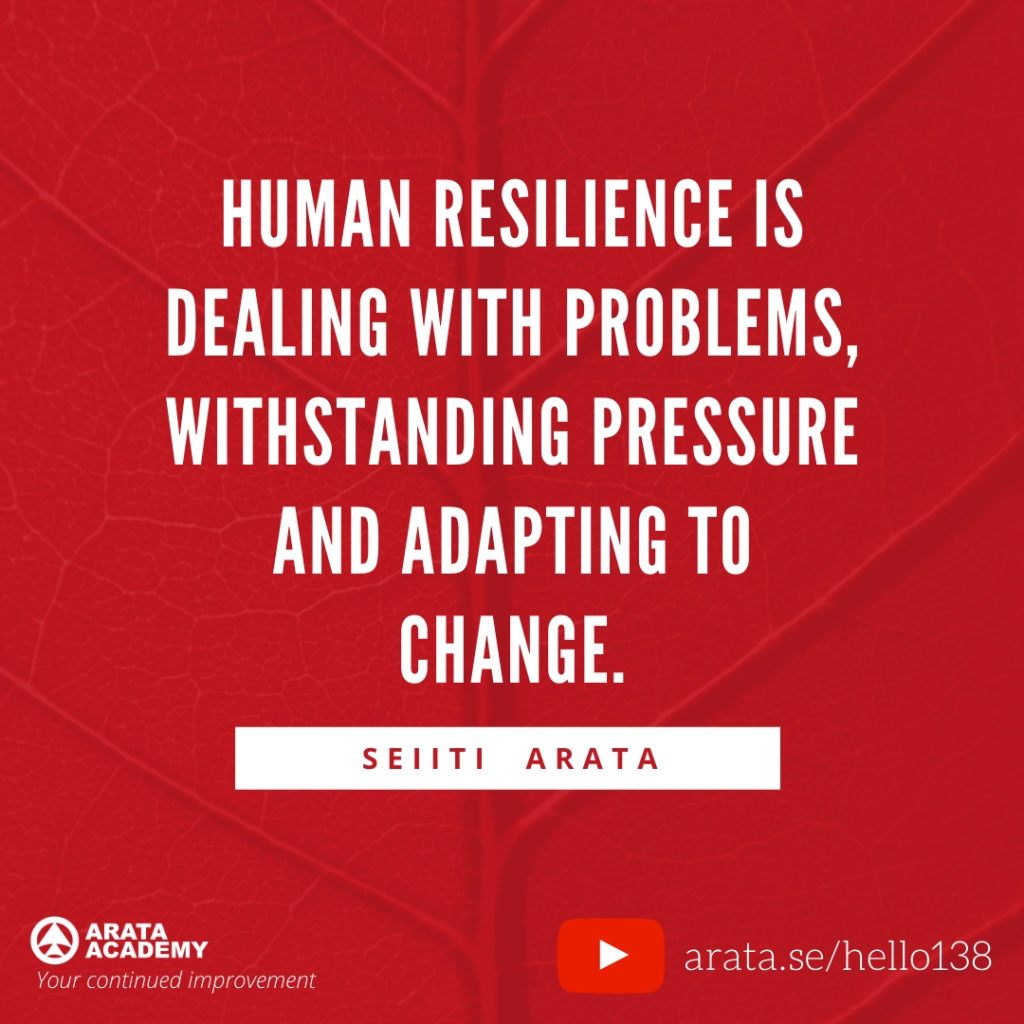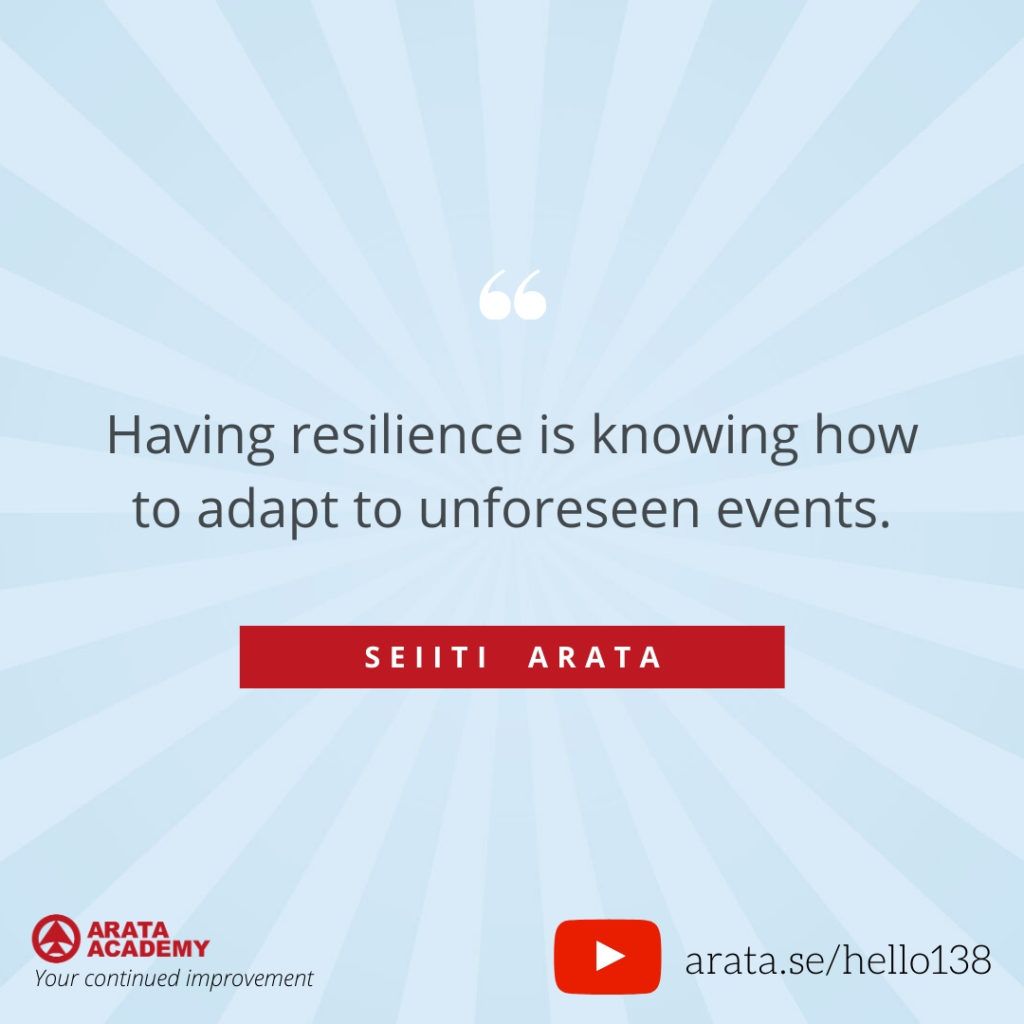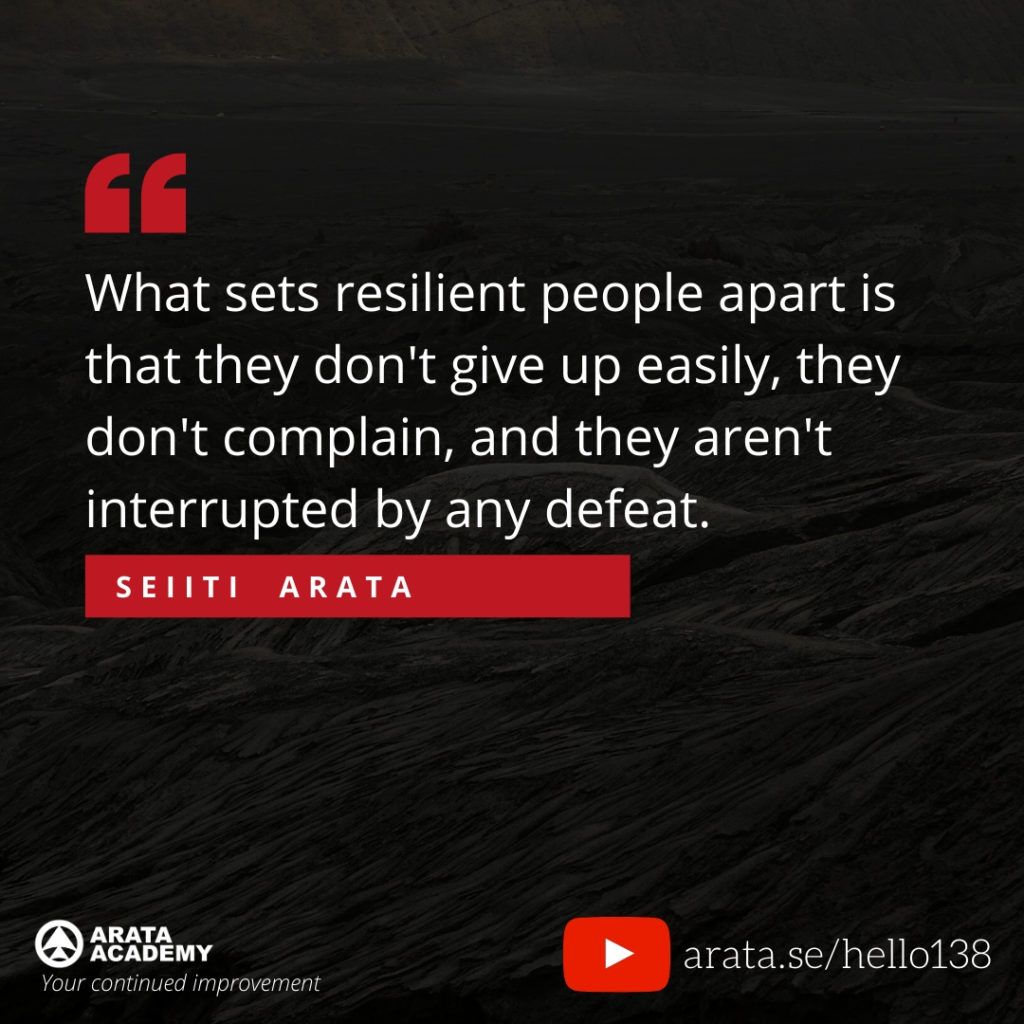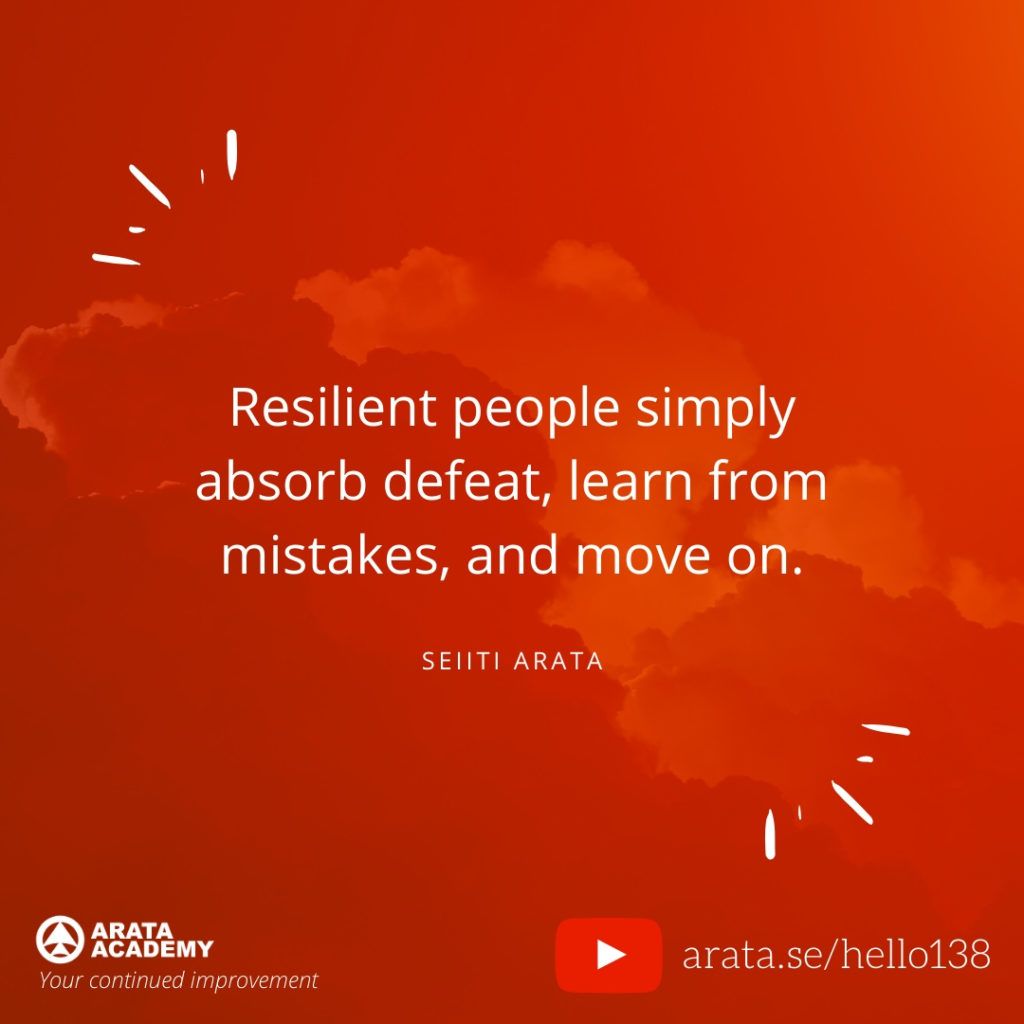Hello! Seiiti Arata. Think about the problems that are disturbing your sleep. Think about the concerns and fears that make you think of giving up. In order for you to overcome all these problems, you will need resilience. Do you know what human resilience is?
Imagine that you have made a big change in your life. You decided to change profession, start a business, live in another country, any other kind of change.
Your plan starts well, until something unexpected happens. An innovation makes your profession outdated. The economic market plummets. The country you were moving to denies your visa …
What would your reaction be? Could you adapt to the unforeseen, adjust your plan and move on? Or would you be sad, unmotivated and start complaining about life?
If you can overcome obstacles and move on, congratulations. You are a resilient person.
Otherwise, do not worry. Our conversation today will show you the skills you need to be a more resilient person in no time.
Resilience means knowing how to adapt to unforeseen events.
A few years ago, there was a roadmap almost guaranteed for those who wanted to have a good professional and financial life.
Basically you had to study, get a specific education, find a good job, and stick with it to advance your career through retirement.
This scenario has changed very fast. Today the average work in the same company is about two or three years. If you think a career is thirty-five or so, it means you can have ten or more jobs during your working life.
Being resilient is more important than ever. You need the ability to adapt well to change.
And for now we are just talking about resilience at work. Think about all the other changes that are taking place in other areas. And think about the speed of these changes.

That is why one of the key skills you must acquire today is the ability to adapt to change, overcome problems, and move on.
And the name of the game is human resilience.
Human resilience is based on problems, pressure and flexibility.
Have you ever seen a Rocky Balboa movie? What made the character a boxing champion was not exactly his ability to hit opponents. It was his ability to be hit constantly and move on.
Resilience, for psychology, is people’s ability to cope with problems, withstand pressure, and have the flexibility to adapt to change.
One of the best known examples of resilience in the world is physicist Stephen Hawking. When he was emerging as a physics genius at age twenty-one, he was diagnosed with amyotrophic lateral sclerosis. That is a terrible and incurable degenerative disease that gradually paralyzes the muscles of the body.
Hawking was diagnosed in 1963 and doctors gave him a few years to live. Contrary to expectations, he lived until 2018, at seventy-six, with two marriages, three children, and three grandchildren.
And it has become one of the most famous and awarded scientists of all time. For many people, it is the very meaning of the word resilience.

But in fact the meaning of this word comes from physics. Resilience means the ability of some materials to absorb impacts and return to their original shape. Steel, for example, is a very resilient metal alloy. Strong as iron and malleable as gold.
The very formation of the word leads to this understanding. It joins the verb silie, which means to jump, and the prefix re, which means again. That is, jump back to the original state.
Thirty years ago, psychology began to use the term human resilience to describe people who have the ability to cope, learn from defeat, and grow emotionally.
The word gained a lot of popularity after the terrorist attack on the United States on September 11, 2001. After the tragedy, the US government distributed booklets encouraging the population to be more resilient, to resume life and to overcome trauma.
Being resilient doesn’t mean being invincible
Many people confuse being a resilient person with being invincible, unshakable or having no problems in life.
However, this is not true. The most resilient people are the ones who often are hit by life’s problems.
What sets resilient people apart is that they don’t give up easily, they don’t complain, and they aren’t interrupted by any defeat. Resilient people simply absorb defeat, learn from mistakes, and move on. The key word is adaptation.
Once again, the surviving species are neither the strongest nor the most intelligent species, but the ones that best adapt to change.
There are several circumstances that may or may not favor the development of emotional resilience in each person. Education, family relationships and social context are the most pointed by experts.
But the good news is that resilience is a skill. And, like every skill, it can be trained and developed at any stage of life.
This means that even if you do not consider yourself a resilient person, it is possible from today onwards to begin to strengthen your resilience to face life’s problems with a growth and learning mindset.
If you want to discover the nine skills a resilient person practices, I have taken a free special lesson on how to be more resilient in just nine steps.
This is a class only for those who are committed to their own personal development. To participate, simply visit https://arata.se/resilience and register to access exclusive content on human resilience.
9 skills to practice your resilience from today
We have seen that resilience is the ability to cope with problems, withstand the pressure and adapt to change. This is an extremely important skill for a world of constant change.
In this special class, we will look in detail at the characteristics you need to acquire to become a more resilient person.
The scale measures nine characteristics that are very present in people who have high resilience. Let’s look at each one and understand how you can practice these skills for more resilience.
1. Self-efficacy
Effectiveness is the power of a cause to produce a certain effect. Self-efficacy is having this power over yourself.
A resilient person has the ability to recognize the problems ahead, draw up a plan for solving those problems, and effectively execute the plan.
This first feature of resilient people is a kind of fuel for the second: problem solving.
2. Troubleshooting
Emperor Marcus Aurelius said that what prevents action favors action and what stands in the way becomes the way. That is, the obstacle is the path itself.
By believing in one’s own effectiveness, those with resilience can solve problems more objectively than the average person.

The difference here is in the action: the person does not let himself be stopped by the difficulties that appear ahead. Rather, she understands that the obstacle is the way, that the problem is part of the solution.
Instead of considering problems as a foreign body that invades life and gets in the way between us and our aspirations, resilient people understand that overcoming these problems is exactly the way to accomplish their goals.
What we often call problems, this tension between who we are and what we want to be, between our real situation and our desired situation, is the very substance of life from the point of view of a resilient person.
3. Temperance
Seneca said that the first victim of lack of temperance is your own freedom. If you drink too much, sleep too much, work too hard, or overdo it in any other habit, your freedom is compromised by excess. You become a slave to your exaggerations.
The virtue of temperance is the ability to control one’s desires, the ability to exercise control over our wills and instincts. It is the general balance of being.
Those who are resilient can control their impulsiveness. It can regulate emotions flexibly while maintaining serenity under pressure.
4. Empathy
Empathy is a person’s ability to put himself in someone else’s shoes and see the problem from the other person’s point of view. Many sages regard empathy as the most precious of all human qualities.
Those who can project feelings on others also tend to be more resilient, as most of our problems involve other people. And knowing how to deal with people, understand their point of view, is halfway to solving any problem.
5. Proactivity
To be proactive is to have a behavior that is the result of your own conscious choice, a choice based on a scale of values, a life planning. And not a choice that comes from conditioning or is based on selfish feelings.
Being proactive is more than taking initiatives. It is recognizing that we are responsible for our choices and that we are free to choose based on principles and values rather than moods or conditions.
In the Planning Your Life course, one of the pillars for building effective planning that can turn your greatest dreams into reality is precisely the pillar of proactivity.
Proactive people are change agents and do not engage in reactive behavior or fall victim when something does not go as planned. As a result, they are more resilient to adapt to the problems that arise during the execution of the plan.
6. Social competence
You will hardly find someone who is resilient being all alone. Interaction with other people is critical to overcoming high pressure situations.
You can better understand the concept of social competence by remembering a situation where you needed help from others to overcome a problem and return to your pre-problem state. It can be a virtual community, a group of friends, your family… a resilient person is competent to maintain a proactive and flexible search for support in the society in which he lives.
7. Tenacity
Like resilience, tenacity is also a term that comes from physics.
Tenacity is a measure of the amount of energy a material can absorb before fracturing.

Carried into psychology, tenacity represents a person’s ability to absorb setbacks, disappointments, and even injustices without giving up the goal he has in mind.
8. Optimism
One of the secrets of resilience is knowing how to tolerate uncertainty and ambiguity hoping that in the end the problem will be solved as best as possible.
For this, a good deal of optimism is essential to bring some mental and emotional stability in times of stress.
An excellent example of resilient optimism is that of psychiatrist Viktor Frankl, author of the book In Search of Meaning.
The book tells how Frankl managed to survive a Nazi concentration camp by exploring people’s existential meaning and the spiritual dimension of existence, in what he himself defined as the thesis of tragic optimism.
I recorded a video about this book, which you can access at https://arata.se/searchformeaning
9. Mental Flexibility
The ninth and last trait is probably the defining characteristic of a resilient person.
Mental flexibility allows you to adapt to different situations, however difficult they may be, to find creative ways to get out of the problem and return to the normal state.
This means knowing how to control emotions, how to maintain calmness, and how to act on what each situation calls for.
In a world where everything changes all the time, at a frightening speed, having more resilience will help you overcome many challenges and develop as a person.
The main goal of resilience is not to restore the past, not to avoid problems, not to be invincible.
It is simply generating conditions for continual improvement by learning from mistakes and maintaining your purpose as you adapt to whatever situation arises.
To do this, you must always be practicing the nine skills of the highly resilient: Self-efficacy, Problem Solving, Temperance, Empathy, Proactivity, Social Competence, Tenacity, Optimism, and Mental Flexibility.
With these skills, you will have almost everything you need to reach your biggest goals. If you want a structured method to achieve these goals, I invite you to take a look at the Planning Your Life course.
This is a hands-on course at Arata Academy for you to build your life planning based on three pillars: Purpose, Proactivity, and Protagonism.

